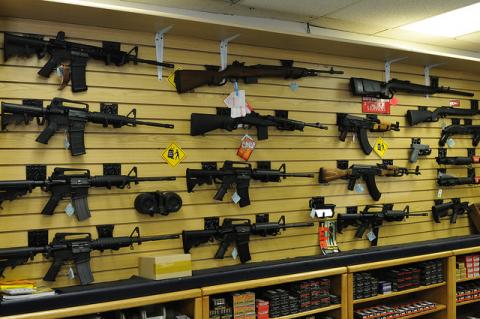Guns: Social Ill Or Civil Right?
Dec 20,2015
In the wake of high-profile mass shootings in San Bernardino, Charleston, Colorado, and Oregon, the American people are as perplexed about guns as they are panicked by them. Despite living in one of (if not the) most gun-friendly nations in the world, Americans are, with the exception of terrorism, more horrified by events like these than they are other types of crime. Perhaps it's just the senselessness, the wanton barbarity of it all that baffles them. How could the perpetrators of these atrocities have gotten their weapons so easily, they demand to know. After all, haven't there been 355 mass shootings this year alone? Shouldn't that be reason enough to take "common sense" measures to keep guns out of the hands of those who would do ill with them?
However, there is a problem with the statistic upholding this argument: it's not true.
Although the people (and by people, I mean gun control proponents) parroting the 355 number are loath to say it, there is no official definition of "mass shooting," a fact confirmed by Mark Follman. As national affairs editor for Mother Jones, one would be hard pressed to claim that Follman is on the payroll of the NRA: indeed, he believes Congress needs to step up efforts to research gun violence, but, commendably, is not willing to spread falsehoods to help his cause. He explains that the definition of mass shooting used to get the 355 stat includes much more than the incidents involving disgruntled lone wolves gunning down innocent people in public places so typically associated with the phrase. If one takes out the gangland shootings in the middle of the night that, say, kill one and injure three, then one is left with 73 total mass shootings. 73 total mass shootings, Follman adds, since 1982, a far cry from the epidemic of mass murder painted by the aforementioned, inflated statistic. While it is undeniably true that misguided young men choosing to partake and perish in gang warfare is a tragedy in and of itself, it is a far cry from innocent civilians who through no fault of their own were murdered by a deranged malcontent. Only a moral ignoramus would claim that they are equivalent, which is basically what people (again, gun control proponents) do when they cite 355 mass shootings this year.
True, one might concede, but doesn't the United States have a truly unprecedented gun problem? Only if you ignore actual data on the matter: according to the Centers for Disease Control and Prevention, although the US has a higher rate of homicides involving firearms than other industrialized countries, gun violence, as part of a wider trend in crime rates, has decreased exponentially within the past 20 years. This in spite of the Congressional "inaction" decried by gun control supporters and cited as evidence of what they claim to be the nation as a whole's complicity in such horrors as the San Bernardino shooting. In addition, the majority of gun deaths in the country are not homicides, but rather suicides, which raises another serious flaw in the arguments put forth for gun control. By conflating one type of gun violence with another when agitating against firearms, they are for all intents and purposes arguing that suicide is tragic in the same way that homicide is tragic, which on the face of it is absurd. You can certainly mourn the loss of a loved one to suicide just as you would the loss of a loved one to murder, but to act like someone taking their own life of their own volition is somehow as inhuman as an act in which a clearly guilty party aggresses against another is preposterous.
Considering the above information, it becomes painfully obvious that what motivates anti-gunners is not fact-based reasoning or sound moral deduction but a personal distaste for firearms. And that's fine: as an American, you are entitled to hate guns, bullets, hunting, the NRA, Charlton Heston, and the Second Amendment all you want. You can even belittle the arguments of pro-gun people that firearms and the Second Amendment are vital to protecting our freedom from an overbearing government as antiquated, quaint, and ridiculous in an era of heavily-armed spree killers. But before you point us to Sandy Hook, I would like to point you to Burundi.
Situated right next to war-torn Rwanda, itself scene of the clearest cut case of genocide in the modern era, Burundi has suffered from ethnic instability over the past few decades. But it was an announcement just this past November that sent thousands pouring out of the country. After a highly-contested and probably illegal third bid for the presidency of the African nation, Pierre Nkurunziza declared that all citizens were ordered to turn over any and all illegal firearms to the government or prepare to be "dealt with as enemies of the nation." The president's edict raises a major question: why did Burundians feel the need to own firearms in spite of what the law said in the first place? Could it be that they feared (presciently, as it turns out) that at any given moment, their good fortune could change and the people that were supposed to protect them could turn on them and that they would feel safer if they had some chance of protecting themselves and their loved ones? Might be something you'll want to mention the next time somebody says the Second Amendment is an anachronism and you don't need guns.






